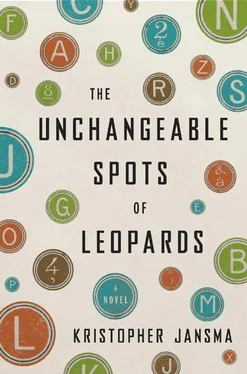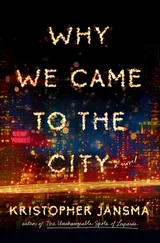I scrolled through The Buddha Channel, MTV Brazil, Fashion International, Szechuan BabyNet — I froze when I saw the listing for Radio Télévision Luxembourg.
“Is your suite prepared to your liking?” the attendant asked.
“Am I still on a plane?” I gasped.
“Yes, sir,” she answered with a smile.
“How much does this cost?” I asked.
“I have no idea, sir,” she replied.
“About twelve, round trip” came a voice from behind Shahrazad. An adjacent panel slid open and I found myself eye to eye with a harried-looking businessman, already half into a miniature bottle of Scotch.
“All this for twelve hundred?” I said, looking back at my bedchamber.
“Twelve thousand ,” the man said casually.
Taking my cue from him, I coolly suppressed my own shock at the statement. “Right. Twelve thousand. That’s what I meant.”
The man smiled at me as Shahrazad excused herself to board the rest of the passengers.
“Gene Packard,” the man said, extending a hand. “Nice to meet you, son.”
I was suddenly wishing I had gotten dressed up for the flight. Mr. Packard was wearing a golden-silk-backed wool vest and a gleaming tie to match. I was wearing my usual teaching gear — a pair of Italian shoes, some dark blue jeans, and my thrift-store blazer, with a shirt I had meant to iron. Packard seemed to note this, for he said, “You know, they’ll press that for you.”
“Of course,” I said. “That’s why I didn’t press it before. Might as well have it done fresh.”
“What’s your line?” Packard asked, pouring me a Scotch without asking.
“I’m in journalism.”
“Well, you’re headed to the right place,” Packard said with a wink. “The future is in Dubai, sure as I’m standing here before you.”
After takeoff, over several Scotches, Packard told me the whole story of Dubai. One of seven emirates that banded together when the British left the gulf in the late seventies, Dubai had made its place in the world in the expected way — by peddling shitloads of oil and petroleum to freedom-loving countries such as our own, keeping profits high by relying primarily on underpaid and often-violated South Asian workers. But in recent years the forward-thinking emirate realized the inevitable endgame of the oil business, something that America, despite Al Gore’s admonishments and the recent rash of celebrities espousing greenness, has collectively failed to realize. There’s simply not enough oil to go around forever. So Dubai decided that while the rest of the world continued slaughtering one another over who would get the finite amount of oil that remained, they would begin diversifying their portfolios. Dubai turned into a playground for the wealthy, particularly those in Europe, featuring seven-star hotels, man-made islands, and even indoor ski slopes. If there was one thing that a lifetime in the oil business taught an emirate, said Packard, it was that people are addicted to opulence. A growing number of American businesses came to set up shop in the new Silicon Valley, where Microsoft, IBM, Oracle, and the EMC Corporation were merrily cashing in on expansive tax-free zones. Packard assumed I was headed just down the block to where CNN, Reuters, and the Associated Press had all set up their offices of late.
“All these people here,” Packard said, motioning to one of his three cabin windows. I could see the New York skyline clearly against the horizon still, and I silently bid it adieu. “They think they’re living in the center of the universe. But we’re headed to the real McCoy.”
And it’s funny, but, looking down at all those hard lines of Manhattan, the grids of streets and office windows — all getting smaller and smaller — I felt as if I had evolved, after all. Not just into Timothy Wallace, but into someone cleverer, more confident.
Up and down Park Avenue and along Canal Street scurried millions who felt they had the grit of the Real World beneath their fingernails. Because they were making it there, they assumed they could be making it anywhere. And in the blare of taxi horns and the roar of subway tunnels, they bought and sold, networked and dialogued, listened to NPR on podcasts and read the headlines off the New York Times website. It was the city where I’d written my first novel and where my first real friendships had flourished, grown ripe, and eventually rotted. I’d come to it as a stranger, only to learn its every avenue and alleyway. But from a few thousand feet up, I could see that it was all just a little island in a vast and unfamiliar landscape. On the plasma screen in my suite, I could see the city I was bound for, Dubai — self-proclaimed land of make-believe — a city with ski slopes in the desert and sheiks in limousines, a city where the hotels kept leopards in cages in their lobbies and gave themselves seven stars out of five. A city where no one expected anything to be true.
• • •
But all of that is another story, and I can see you are getting tired. Get your new wife to bed. There is a lot to see and do around here. Maybe we’ll meet again tomorrow night. Maybe I’ll continue with the truth. Maybe I won’t. Would you know either way? Would you care, truly? Or perhaps I’ll be long gone by then; who can say? We’re all just travelers, after all, telling stories, passing time. Get some rest, then. Tomorrow could bring anything. Al Wada’ —good-night.
“The far east. Lovely spot it must be: the garden of the world, big lazy leaves to float about on, cactuses, flowery meads, snaky lianas they call them. Wonder is it like that. Those Cinghalese lobbing around in the sun, in dolce far niente. Not doing a hand’s turn all day. Sleep six months out of twelve. Too hot to quarrel. Influence of the climate. Lethargy. Flowers of idleness.”
— JAMES JOYCE, ULYSSES
With only ten minutes left before my train leaves toward Sigiriya, I jam down on the Necto-soda-sticky keys of the Internet café computer. As quickly as possible, I pound out the final lines of a truly ponderous conclusive paragraph:
The essay’s closing image of a young George Orwell laughing with British soldiers and Burmese natives while the man they’ve just executed hangs “a hundred yards away” is surely a haunting vision of the colonial world order: oppressor and oppressed amicably sharing a Lethean drink, while the unnamed voice of dissent swings ominously in the winds.
I hit Save, double-check my PayMeNow account, and then click Send. In a millionth of an instant, my impenetrable thirty-five-page wall of rhetoric is dissembled into hexadecimal electrons and fired off into the stratosphere — bounced down thirty-five hundred miles clockwise around the globe and into the high-tech library of the Shanghai International Students’ School, where an obese and princely little Chinese boy who goes by “simon/  ” has been waiting eagerly for his midterm assignment. I’ve never met this particular Simon personally, of course, but after teaching for several years at a school in Dubai, attended primarily by the hashish-addled children of the House of Saud, I’ve come to know his type quite well. During my teaching days I had often wondered how my students managed to turn in shining theses that included words like hegemonic and pedagogical , or even agitprop and autarky. It didn’t take long to figure out that most of them had anonymous Internet ghostwriters cranking out every paper they turned in. So when being a teacher finally lost its charm, I decided that taking up professional plagiarism could grant me decent pay, freedom to travel, and unlimited opportunity to lob my own thought-grenades into the halls of academia. In just a year at it, I’d traveled the Mediterranean, been through Singapore and Hong Kong. I’d visited every single European nation (except for Luxembourg) — all while writing somewhere on the order of two thousand pages of literary criticism, disseminated happily into the thesis collections of universities worldwide.
” has been waiting eagerly for his midterm assignment. I’ve never met this particular Simon personally, of course, but after teaching for several years at a school in Dubai, attended primarily by the hashish-addled children of the House of Saud, I’ve come to know his type quite well. During my teaching days I had often wondered how my students managed to turn in shining theses that included words like hegemonic and pedagogical , or even agitprop and autarky. It didn’t take long to figure out that most of them had anonymous Internet ghostwriters cranking out every paper they turned in. So when being a teacher finally lost its charm, I decided that taking up professional plagiarism could grant me decent pay, freedom to travel, and unlimited opportunity to lob my own thought-grenades into the halls of academia. In just a year at it, I’d traveled the Mediterranean, been through Singapore and Hong Kong. I’d visited every single European nation (except for Luxembourg) — all while writing somewhere on the order of two thousand pages of literary criticism, disseminated happily into the thesis collections of universities worldwide.
Читать дальше

 ” has been waiting eagerly for his midterm assignment. I’ve never met this particular Simon personally, of course, but after teaching for several years at a school in Dubai, attended primarily by the hashish-addled children of the House of Saud, I’ve come to know his type quite well. During my teaching days I had often wondered how my students managed to turn in shining theses that included words like hegemonic and pedagogical , or even agitprop and autarky. It didn’t take long to figure out that most of them had anonymous Internet ghostwriters cranking out every paper they turned in. So when being a teacher finally lost its charm, I decided that taking up professional plagiarism could grant me decent pay, freedom to travel, and unlimited opportunity to lob my own thought-grenades into the halls of academia. In just a year at it, I’d traveled the Mediterranean, been through Singapore and Hong Kong. I’d visited every single European nation (except for Luxembourg) — all while writing somewhere on the order of two thousand pages of literary criticism, disseminated happily into the thesis collections of universities worldwide.
” has been waiting eagerly for his midterm assignment. I’ve never met this particular Simon personally, of course, but after teaching for several years at a school in Dubai, attended primarily by the hashish-addled children of the House of Saud, I’ve come to know his type quite well. During my teaching days I had often wondered how my students managed to turn in shining theses that included words like hegemonic and pedagogical , or even agitprop and autarky. It didn’t take long to figure out that most of them had anonymous Internet ghostwriters cranking out every paper they turned in. So when being a teacher finally lost its charm, I decided that taking up professional plagiarism could grant me decent pay, freedom to travel, and unlimited opportunity to lob my own thought-grenades into the halls of academia. In just a year at it, I’d traveled the Mediterranean, been through Singapore and Hong Kong. I’d visited every single European nation (except for Luxembourg) — all while writing somewhere on the order of two thousand pages of literary criticism, disseminated happily into the thesis collections of universities worldwide.









